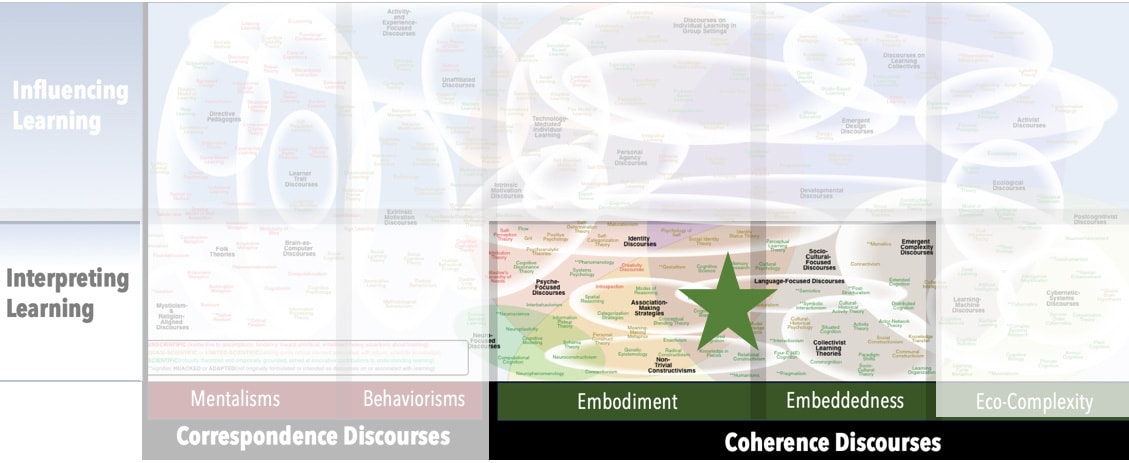Focus
Culture unfolding from and being enfolded in individual mindsPrincipal Metaphors
- Knowledge is … culturally conditioned scope of possible action and interpretation
- Knowing is … culturally conditioned action
- Learner is … culture-shaping agent and agent-framing culture
- Learning is … participation
- Teaching is … co-participation
Originated
1990sSynopsis
Cultural Psychology is founded on the tenet that mind and culture are inseparable. It thus focuses on how cultures reflect and shape individuals’ psychologies, and how individuals’ psychologies reflect and shape cultures. It is motivated in part by the relatively recent popular realization that most psychological research has been W.E.I.R.D. – that is, based on Western, Education, Industrialized, Rich, and Democratic populations – and has thus not been adequately attentive to variations in, for example, social values, reasoning strategies, and modes of categorizing. Cultural Psychology has particular relevance for Developmental Discourses. Associated discourses include:- Cross-Cultural Psychology – a branch of Psychology concerned with the ways that different cultures interpret and explain psychological phenomena. Associated constructs include:
- Acculturation Strategies (John Berry, 1980s) – a typology of three ways that nondominant groups manage their engagement with dominant cultural groups. Those ways, and a possible consequence, comprise:
- Assimilation Strategy – engaging regularly with the dominant group, with little or no effort to maintain one’s original cultural identity
- Integration Strategy – endeavoring to become an integral part of the social network while maintaining one’s original culture
- Separation Strategy – avoiding engagement with the dominant group while maintaining one’s original culture
- Marginalization – being shunned by either one’s original culture or the dominant culture, owing to a failure to participate in the one or the other (i.e., due to one’s Acculturation Strategy)
- Acculturation Strategies (John Berry, 1980s) – a typology of three ways that nondominant groups manage their engagement with dominant cultural groups. Those ways, and a possible consequence, comprise:
- Ethnic Psychology (Ethnopsychology; Racial and Ethnic Minority Psychology) – a branch of Psychology concerned with how aspects of one’s ethnicity (e.g., culture, language) influence psychological phenomena (e.g., attitudes, interpretations, behaviors)
- Multicultural Psychology – an attitude within Psychology with a strong social-justice sensibility, that acknowledges that one’s worldview and self of self are influenced by such identifications as race, ethnicity, gender, sexual identification, age, class, education, and religion.
Commentary
There are relatively few condemning criticisms of Cultural Psychology, although there are several generalized anxieties that are typically linked to methodological difficulties (e.g., self-reporting data is an easy and popular approach to collecting lots of information, but its unstable and can be very misleading). Consequently, a major concern with Cultural Psychology is the risk of overstating cultural differences that were previously ignored or understated. Another is the risk of essentializing or stereotyping – that is, of imposing broad and general trends (e.g., western sensibilities trend more toward individualism, and eastern more toward communalism) onto subgroups or even individuals.Authors and/or Prominent Influences
Richard ShwederStatus as a Theory of Learning
While it does not typically define itself as such, Cultural Psychology can be properly described as a theory of learning.Status as a Theory of Teaching
Cultural Psychology is not a theory of how to teach, but it does afford insight into broad cultural tendencies toward particular conceptions and modes of teaching.Status as a Scientific Theory
Cultural Psychology is subject to regular criticisms related to its methodologies. It is, however, attentive to its frames and grounding metaphors, and substantial empirical evidence is being gathered to inform it.Subdiscourses:
-
Acculturation Strategies -
Acculturation Strategies (John Berry, 1980s) – a typology of three ways that nondominant groups manage their engagement with dominant cultural groups. Those ways, and a possible consequence, comprise:
- Cross-Cultural Psychology - Cross-Cultural Psychology – a branch of Psychology concerned with the ways that different cultures interpret and explain psychological phenomena
- Ethnic Psychology (Ethnopsychology; Racial and Ethnic Minority Psychology) - Ethnic Psychology (Ethnopsychology; Racial and Ethnic Minority Psychology) – a branch of Psychology concerned with how aspects of one’s ethnicity (e.g., culture, language) influence psychological phenomena (e.g., attitudes, interpretations, behaviors)
- Integration Strategy - Integration Strategy – endeavoring to become an integral part of the social network while maintaining one’s original culture
- Marginalization - Marginalization – being shunned by either one’s original culture or the dominant culture, owing to a failure to participate in the one or the other (i.e., due to one’s Acculturation Strategy)
- Multicultural Psychology - Multicultural Psychology – an attitude within Psychology with a strong social-justice sensibility, that acknowledges that one’s worldview and self of self are influenced by such identifications as race, ethnicity, gender, sexual identification, age, class, education, and religion.
- Separation Strategy - Separation Strategy – avoiding engagement with the dominant group while maintaining one’s original culture
Map Location

Please cite this article as:
Davis, B., & Francis, K. (2023). “Cultural Psychology” in Discourses on Learning in Education. https://learningdiscourses.com.
⇦ Back to Map
⇦ Back to List
